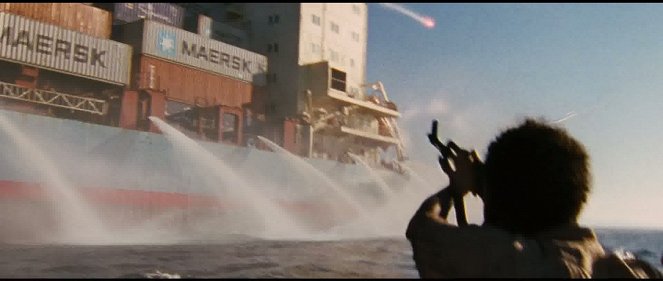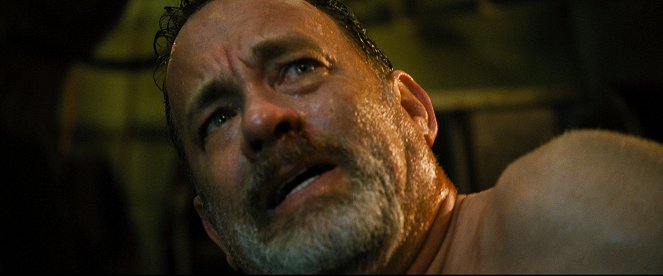Réalisation:
Paul GreengrassScénario:
Billy RayPhotographie:
Barry AckroydMusique:
Henry JackmanActeurs·trices:
Tom Hanks, Catherine Keener, Barkhad Abdi, Barkhad Abdirahman, Faysal Ahmed, Mahat M. Ali, Michael Chernus, David Warshofsky, Corey Johnson (plus)VOD (3)
Résumés(1)
Capitaine Phillips retrace l'histoire vraie de la prise d'otages du navire de marine marchande américain Maersk Alabama, menée en 2009 par des pirates somaliens. L'approche très personnelle du réalisateur Paul Greengrass fait du film un thriller palpitant doublé d'une peinture complexe des conséquences multiples de la mondialisation. La relation qui s'instaure entre le capitaine Richard Phillips, commandant du bateau, et Muse, le chef des pirates somaliens qui le prend en otage, est au cœur du récit. Les deux hommes sont inévitablement amenés à s'affronter lorsque Muse et son équipe s'attaquent au navire désarmé de Phillips. À plus de 230 kilomètres des côtes somaliennes, les deux camps vont se retrouver à la merci de forces qui les dépassent... (Sony Pictures Releasing France)
(plus)Vidéo (12)
Critiques (15)
Vous ne craindrez pas trop pour la vie de Phillips/Hanks en tant qu'otage, car tous les personnages dans le film savent que sa mort ne profiterait à personne. Cette certitude, qui réduit la tension du film, ne s'affaiblit que dans les dernières minutes. À part ça, Capitaine Phillips est une énigme intéressante du genre « mais comment va-t-il s'en sortir ? ». Vol 93 permettait à Greengrass de provoquer une émotion plus forte chez le spectateur à cet égard. En tout cas, aucun autre réalisateur contemporain ne parvient à mieux camoufler la propagande de l'armée américaine dans un film d'action captivant, même aux yeux des spectateurs avertis. Et Hanks excelle.
()
Paul Greengrass today has no competition in this type of intimate action movies based on real events. This one is incredibly tense and with a frantic pace (thanks to the camera and the editing), even in those scenes where basically nothing is happening and the characters are just talking (which is most of the film, really). And the emotional climax will give you the final KO. No doubt, one of the best films of the year.
()
“We all got bosses.” Concerns that, unlike the unaffected Danish film A Hijacking, this would be a heroic drama were fulfilled by Greengrass’s Captain Phillips to a much lesser extent than I had feared. Yes, instead of an ordinary employee, the (moral) focal point of the narrative is a conscientious American in an important position and, what’s more, portrayed by an actor whose name is synonymous with the word “credibility”. However, Phillips realistically prioritises his own survival over dressing himself up as a hero, as evidenced especially in the climax with its non-Hollywood rawness, which is the final demonstration of the emphasis that the film places on the intensity of visceral experience. The expression of concern for Phillips’s wife (the considerably underused Catherine Keener) in a less emotive written form is a twice utilised method of “desentimentalisation”. ___ Whereas in A Hijacking Lindholm never loses sight of the socio-cultural context and sees the development of the events as a consequence of the uncompromising application of corporate logic, Greengrass sets aside the broader context after the beginning and uses the situation to focus particularly on strong emotions instead of the clash of cultures and classes (and generations). Nevertheless, he amplifies his criticism of inequality during the second half by expanding the point of view of the narrative, which had previously been limited to the two captains, to include that of the all-seeing American military. The shots of seamen exhibit cool professionalism in striking contrast to the “DIY” methods of both the pirates and the crew of Phillips’s ship. ___ Captain Phillips is political also in following the trend of contemporary genre movies consisting in depicting an individual having to rely on himself. The protagonist is gradually stripped of all privileges of civilisation and nearly all of his possessions (including his clothes) and, through his manoeuvring, finds himself at the same level as the pirates. A certain political nature can also be seen in the attempt at a balanced view of the causes leading to the actions of either side of the conflict. From the opening minutes, parallels are drawn between the lives and livelihoods of Phillips and the pirates. Like Phillips, the pirates want only to do their jobs, make money and get back home. Because the division of roles into prey and victim is not fixed, those roles can be reversed in the second half of the film. The inconsistency of this avoidance of a black-and-white view of reality becomes apparent when more closely watching the camerawork. The point-of-view shots belong exclusively to Phillips. By comparison, the protagonist is filmed with shots that are neutral in terms of perspective and seemingly don’t belong to anyone. In other words, the pirates do not have control over the image. ___ Regardless of the ideological implications, Captain Phillips is a particularly flawlessly rhythmised drama with twists delivered at roughly twenty-minute intervals and a rapidly approaching ending, thanks to which the narrative is gripping, even if you know the actual true story in advance. The essential twist and the broadening of awareness connected with it come after an hour. The sudden change of location serves for more than just making the viewer uncomfortable (“I didn’t expect that”). It also comments on the development of the position held by the main character, who gradually and literally loses the ground beneath his feet (due to the setting, the final phase of this destabilisation is more than obvious). ___ As in Gravity, an individual becomes a lightning rod for many of the problems troubling today’s society, though Greengrass takes that individual’s transformation in a different direction than Cuarón did. In this case, the film is an uneasy (in style) and disturbing (in emotion) response to an uncertain time, paradoxically thanks mainly to the fact that someone thought long and calmly about how to make it. 85%
()
(moins)
(plus)
A superb dramatization and high-octane exhibition of filmmaking adrenaline that once again elevates pseudo-documentary realistic authenticity to a full-blown blockbuster experience. Although Greengrass goes about this unlike anyone from the numerous rows of his many "copy & paste" colleagues, it's a bit of a safe bet on his part, with the camera looking over his shoulder and whizzing between faces just long enough for you to know who he's thinking of. It's not boring at all, but it does last about fifteen minutes longer than audiences would like. Then it would be a fuller experience. And let's face it, when was the last time you saw a Navy SEALS presentation this short and impactful? PS: Hans Zimmer is thanked in the credits, but as the central motif unfolded, I kept subconsciously waiting for the black hood to appear. 4 ½.
()
Paul Greengrass simply knows how to push my buttons. He can make an absolutely awesome thriller on a contemporary theme in a way that makes me feel that I’m the one standing behind the camera instead of him. I mean normally I can’t stand a shaky camera, but he can employ such great editing that moves the whole thing to such levels of perfection that I can accept it without any problem whatsoever. I have accepted it so many times in the past and I accept it now too. And that’s not to mention the fact that the actors deliver some extra-ordinary performances. That includes Tom Hanks and the Somali pirates, who are simply on fire. I would never have thought that such a trivial idea could be squeezed into almost 140 minutes while making sure that not a single minute of it would be boring. And the rescue mission at the end? That was simply a pleasure to behold. A well-deserved five-star rating. It sure doesn’t happen every day that you’d watch a movie while bating your breath for more than two hours.
()



Annonces